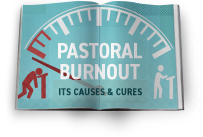Discerning the Signs of Pastoral Burnout
Numerous times a year, for as long as I can remember, I speak with pastors looking for an exit from ministry. The reason isn’t moral failure, or interest in another vocation, or lack of “calling.” The reason, more often than not, is nebulous and hard to describe. When the pastor talks about ministry, he uses words like, “exhausted … discouraged … pointless … distracted … lonely.” No matter how much he sleeps, or drinks coffee, or tries to motivate himself, the tank always feels empty.
Could this be what people call pastoral burnout? If so, how do we discern the signs? Answering that important question is the goal of this article.
Pastoral burnout could be defined as the moment or season when a pastor loses the motivation, hope, energy, joy, and focus required to fulfill his work, and these losses center upon the work itself. These aspects of burnout don’t operate in isolation. They connect and overlap. From time to time, we might lose motivation or hope in ministry. On any given day, we can feel exhausted and joyless. But when all our motivations erode at once, and when their absence persists, I think it’s then that we’ve entered a season of pastoral burnout.
Furthermore, these signs center upon the work of ministry itself. This distinguishes pastoral burnout from other trials: grief after the loss of a child or spouse, intense family troubles, or the experience of depression. A pastor could experience loss of motivation, hope, energy, joy, and focus in ministry for various reasons. But sometimes, ministry itself becomes the trigger point.
Motivation relates to heart affections and desires behind ministry. Paul says, “the love of Christ controls us” (2 Corinthians 5:14). He was willing to suffer beatings and imprisonment “if only I may finish my course and the ministry that I received from the Lord Jesus, to testify to the gospel of the grace of God” (Acts 20:24). The promises of God motivated him (2 Corinthians 1:20). The spiritual health of the church for the glory of God motivated him (2 Corinthians 4:15). The splendor of grace motivated him, and motivation is essential to pastoral vitality.
When we lose all sense of motivation, perhaps because we’ve derived it for too long from the wrong things, we may be in a state of pastoral burnout. The wind that used to fill our sails has faded away. The love of Christ has become an empty idea. The promises of God and the edification of the church feel distant. The things that used to push us out of bed in the morning just don’t push us anymore.
Hope relates to the overall purpose and point to ministry. After the great work of God on Mount Carmel and the defeat of the prophets of Baal, it seems that Elijah expected a big revival. Instead, he received death threats from Jezebel. So Elijah fled to the wilderness. When God met him, Elijah said, “It is enough; now, O Lord, take away my life, for I am no better than my fathers” (1 Kings 19:4). All his jealousy for God seemed to be for nothing. All his sacrifices and suffering seemed to end up at the same place. Now he says, “I might as well die.”
When we begin seriously asking, “what’s the point?” and struggle to find an answer, we’re likely crossing the border toward burnout. The magnet that used to draw us forward has lost its power. The wondrous light at the end of the tunnel has disappeared. No longer do we study, pray, and preach with “eager expectation and hope” (Philippians 1:20). We become cynical, sarcastic, and jaded.
Energy relates to bodily strength for ministry. Paul says to the Thessalonians, “For you remember, brothers, our labor and toil: we worked night and day, that we might not be a burden to any of you, while we proclaimed to you the gospel of God” (1 Thessalonians 2:9). Though tired, Paul had energy for the work. Though Jesus went nights without sleep, he found strength from somewhere for his daily labor.
When exhaustion is our regular state, no matter how much we sleep or rest, we’ve probably entered pastoral burnout. The fuel you pour into the tank just runs out the bottom, or it sits and sours without ever igniting into real energy. It seems as though the Spirit has departed. A persistent lack of energy for ministry is the most common sign of burnout.
Joy relates to the spiritual pleasure of ministry. Hebrews speaks to church members about the ministry of their leaders: “Let them do this with joy and not with groaning, for that would be of no advantage to you” (Hebrews 13:17b). This implies there should be joy for the pastor in his work. Scripture tells us to look to Jesus, “who for the joy that was set before him endured the cross” (Hebrews 12:2).
When all delight in ministry fades away, when “leading the procession to the house of God with glad shouts and songs of praise” has become a thing of the past, nothing more than a vague memory, then we could be experiencing pastoral burnout. As a result, perhaps we’ll start looking to the world for escape. When the burdens of ministry feel so overwhelming that we ask the Lord to kill us, there’s something important he intends us to see (Number 11:10–15).
Focus relates to the engagement of the mind in the ministry. The apostle Paul was able to forget what lies behind and “strain forward to what lies ahead” (Philippians 3:14) because his eyes were fixed upon “the prize of the upward call of God in Christ Jesus” (Philippians 3:15). Because he didn’t consider his life precious but did consider the grace of God as exceedingly precious, Paul focused on the details of the work God assigned (Acts 20:22–24).
When concentrating upon our work feels like climbing a mountain, when maintaining attention for more than five minutes seems impossible—alongside the other signs we’ve discussed—we’re likely experiencing pastoral burnout. Do you regularly catch yourself staring into space? Do you read the same verses over and over without being able to grasp the meaning of the words? Have your movements become robotic, your thoughts jumbled, and your relationships confusing?
Discerning and defining pastoral burnout wisely is critical to finding the wise road out. Though this article isn’t devoted to the solution, I must at least say the answer is found inside the grace of our God, the gospel of Jesus Christ, and the power of His Spirit.









